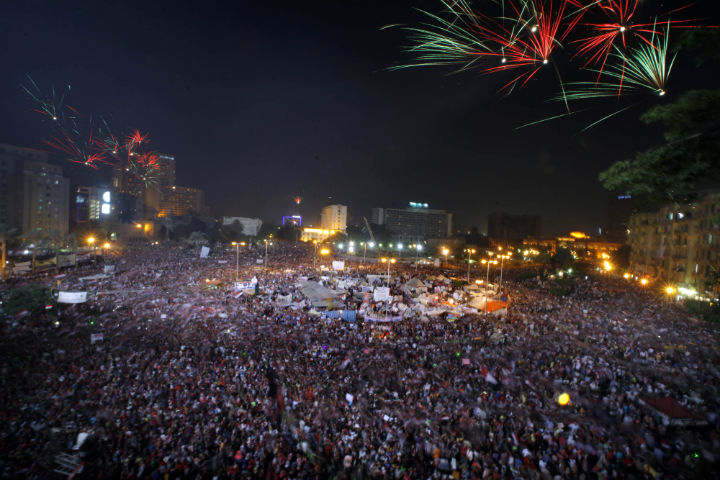The price of oil soared above US$102 a barrel for the first time in over a year as Egyptian President Mohamed Morsi was replaced by the chief justice of constitutional court Wednesday.

Rumours of a military coup against the embattled Islamist leader began affecting the commodity market weeks before the deadline to yield to the demands of millions of protesters loomed.
But after the deadline passed Wednesday, and a defiant Morsi was displaced, the risk of fuel supply disruptions in the Egyptian-controlled Suez Canal were raised even more.
The Suez Canal, one of the world’s busiest shipping lanes that links the Mediterranean with the Red Sea, plays a crucial role in maintaining global energy supplies.
The Middle East accounts for about a quarter of the world’s crude oil output and over two million barrels of oil are transported through the Suez Canal daily.
During the first three months of 2013, 821 oil tankers and 152 ships carrying liquefied natural gas (LNG) passed through the waterway.
The Suez Canal Authority, which operates the waterway, said it “has all the authorities needed for running the Canal without being limited by the laws and the systems of the (Egyptian) government.”
However, the violence and political uncertainty in Egypt, which has killed 23, is not the only factor in the rise of oil.
Read More: Key events in Egypt’s revolution
A report showing an unexpectedly large fall in U.S. stockpiles of crude oil also helped boost prices.
By early afternoon in Europe, benchmark crude for August delivery was up $1.86 at $101.46 a barrel in electronic trading on the New York Mercantile Exchange, having risen as high as $102.18 earlier in the session. On Tuesday, the contract gained $1.61, or 1.6 per cent.
Some analysts suggest market reaction to the political crisis in Egypt was exaggerated.
“Each time there is a bit of confusion in Egypt there will be calls that a geopolitical premium needs to be added to oil because of the risk to the Suez Canal,” said Olivier Jakob of Petromatrix in Switzerland. “But if there is one thing that the military has control of in Egypt it is the Suez Canal. We therefore do not see a significant risk for free passage on the waterway.”
The market reaction may have been heightened by further factors, such as signs that demand is growing. The American Petroleum Institute said Tuesday that U.S. crude inventories dropped by 9.3 million barrels last week, a much larger decline than forecast.
The Energy Department’s Energy Information Administration will release its own report on crude stockpiles — the market benchmark — later Wednesday. Data for the week ending June 28 was expected to show a draw of three million barrels in crude oil stocks, according to a survey of analysts by Platts, the energy information arm of McGraw-Hill Cos.
In London, Brent crude was up $1.31 to $105.31 a barrel on the ICE Futures exchange.
In other energy futures trading on Nymex:
• Wholesale gasoline was up 3.39 cents to $2.8172 a gallon.
• Heating oil added 3.73 cents to $2.9387 a gallon.
• Natural gas was down 4.1 cents at $3.613 per 1,000 cubic feet.
With files from the Associated Press




Comments